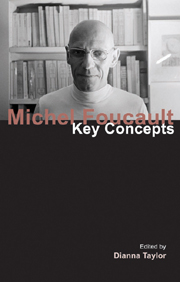5 - Foucault's conception of freedom
from PART II - FREEDOM
Summary
The concept of freedom is an elusive one in philosophy. It lies at the centre of at least two very different sets of philosophical problems. One concerns the metaphysical status of human beings. The other concerns their political status. And, to make matters more complicated, Michel Foucault's perspective on freedom lies within neither set of problems. It does, however, interact with and complicate them. What I propose to do here, then, is to approach Foucault's own approach to freedom in three stages. First, I will discuss the two notions of freedom that characterize traditional philosophy. Then I will turn to Foucault's conception of freedom, showing how it interacts with those traditional notions. Finally, in order to get a better sense of all this, I will briefly contrast his conception of freedom with that of another subtle thinker of freedom, Maurice Merleau-Ponty.
We might call the two traditional conceptions of freedom metaphysical and political. The term metaphysical is somewhat loaded, however, so it might be best to be clear about what we mean by it before we proceed. Metaphysics has been thought to concern the ultimate nature of reality. It concerns what there is, or what the first or founding principles are of what there is. In that sense, it can also be characterized by the term ontology. One area of focus in metaphysics has been with the relation of mind and body. This is because if reality ultimately is made up of two different kinds of stuff – mental stuff and physical stuff – the question of their relationship becomes a central one, as it has been at least since Descartes.
- Type
- Chapter
- Information
- Michel FoucaultKey Concepts, pp. 71 - 84Publisher: Acumen PublishingPrint publication year: 2010
- 1
- Cited by



